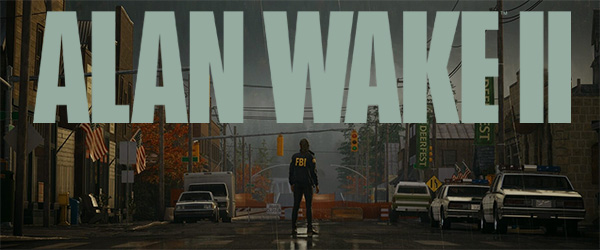
I'll give Remedy this bit of credit: in a world overrun with soul-less, design-by-committee, live-services and vehicles for micro-transaction economies, Alan Wake 2 is a game that actually has a strong creative vision and personality. It follows in the footsteps of Hideo Kojima and Death Stranding by being completely confident in itself and being un-abashedly weird. And just like with Death Stranding, that means that sometimes Alan Wake 2 is genius; other times it's confoundingly stupid and hackneyed!
It's hard even to classify Alan Wake 2 into a single genre. That goes for both narrative genre and also ludic genre. In both cases, it's kind of all over the place. At the most reductionist level, it follows the basic formula of a modern horror game: exploring creepy environments to find keys for doors, fighting monsters as an over-the-shoulder 3rd-person shooter, solving puzzles, and managing a limited inventory. So it's a "horror game", right? In fact, sometimes, it's seriously scary and disturbing. But other times, I'm questioning its "horror" status while I'm laughing out loud to a deliberate joke, or bored out of my mind because nothing scary or particularly exciting has happened in hours. Yet other times still, it's farcically campy or schlocky, and un-intentionally laughable. It's story is ridiculously out there in its concepts and execution, but somehow every beat of the plot is set up and signposted as clearly and obviously as the neon signs that point the player to the next objective in the Dark Place.
Plot twists are signposted more clearly and obviously than the neon signs that often guide the player through levels.
It's also frequently up its own ass. It is, after all, a fictional story about the power of fiction to alter reality (and our perception of reality). It even features the lead designer as a self-insert character within the story. Though surprisingly, he made himself a secondary character instead of one of the 2 playable protagonists. So it's not really about him, but he still found a way to make the entire plot revolve around that secondary character.
In the mind's eye
I feel that Alan Wake 2 is consistently at its best when its sitting firmly in its horror-mystery mode. As such, the opening couple hours of the game really pulled me in and hooked me. The game's main quest and side content are split up into various "cases" for the FBI agent protagonists to solve. There's a mechanic in which the player can retreat into Agent Saga Anderson's "Mind Space", which is an imaginary office room in which she sorts through all the clues she's gathered and strings them together on an imaginary wall in order to fit the puzzle pieces of the mystery together. Each time the player discovers a critical piece of information in the game world, it will show up in the Mind Space's filing cabinet as a new file in a case folder. Putting the clues together in the right way will unlock new lines of inquiry, and can even reveal the next objective.
Agent Anderson can review the known evidence in her imaginary Mind Space office.
Apparently, the actual game doesn't even pause, and continues to play in the background while the player is in the Mind Space. Even though the Mind Space is a full-screen environment, the character can still be attacked by enemies in the "real world". At first, I thought this would be obnoxious, but after the first time I was attacked while trying to re-arrange items on the case board in the Mind Space, I learned my lesson. After that, I actually came to realize that that needing to find a safe, peaceful space in order to let the character think about clues they've discovered (and how to proceed), really helps to emphasize the danger and stakes of the situation.
Arranging the clues in the Mind Space is not very difficult or complicated. It's not like having to solve a person's fate in Return of the Obra Dinn, or anything like that. Most of the time, the process is just going through the motions. Even when there are multiple options for where a piece of evidence can go, the solution can be easily brute-forced without the player having to know anything about what's going on.
The Case Board is an immersive quest log and objective tracker.
Even so, the Mind Space is a creative idea for presenting objectives, quest logs, story summaries, and characterization. The Mind Space at least tries to force the player to have to engage with the events of the story in a meaningful and immersive way. The player has to at least pretend to know how the various events of the story, the characters, and the McGuffins you find all fit together in the broader story in order to progress the main story or side quests.
And in fact, the entire game is about the interplay between the audience and the fiction. For most of the story, it's about the ability of fiction to re-shape people's perception of reality, but as the game goes on, it becomes more and more about the audience's ability to shape or re-shape the actual fiction. It emphasizes that any creative work is made up of both the voices of its creator(s) and also the interpretation and reception of the audience. This has always been true, with all forms of fiction and story-telling, but it's even more true with video games.
[More]